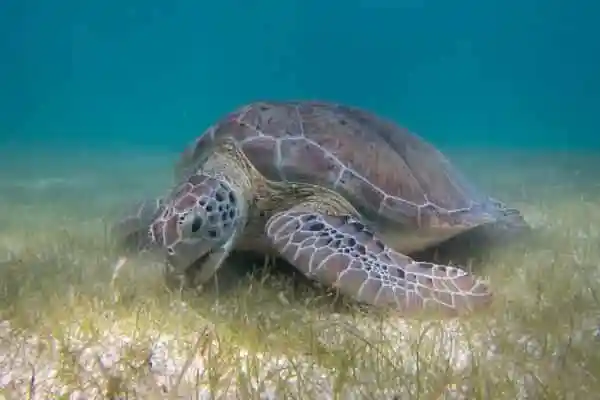By Anonymous
Copyright caymannewsservice

(CNS). The Department of Environment is receiving increasing reports of people feeding sharks and turtles, which they said is “very concerning, as animals conditioned to expect food from humans predictably become more aggressive, endangering both humans and themselves”. Sharks and sea turtles in Cayman waters already face myriad challenges which have historically reduced local populations to endangered levels.
The DoE has spent decades researching and protecting these iconic creatures and expressed disappointment with intentional feeding that obviously has a negative impact.
Aside from safety concerns, altering shark behaviour ripples through the food chain, changing the predator-prey relationships that maintain the delicate reef balance. The DoE said the research is helping scientists better understand how to help their populations thrive in the natural environment.
“It’s therefore disconcerting to learn that intentional feeding of sharks and sea turtles in the wild is taking place again when the negative impacts associated with this are evident,” the department said in an article on its website.
Generally solitary creatures, sharks gathering for free food creates situations ripe for disease transmission, aggression and accidental bites. For these reasons, feeding or attempting to attract sharks has been illegal anywhere in Cayman waters since 2002.
Feeding marine life is a tempting way to get closer to nature, especially when Cayman’s clear waters and abundant marine life make close encounters feel effortless. But offering food to any wildlife can have devastating impacts on animals, habitats, humans and the delicate balance of Cayman’s ecosystems.
Stingray City and the Sandbar were established as “Wildlife Interaction Zones” (WIZ) in 2007 to ensure a clear delineation was made for the permitted feeding and handling of stingrays in these designated areas only. It is illegal to feed, touch or harm stingrays or any other wildlife anywhere in Cayman waters outside of the WIZ.
While no-touch observation is always encouraged, legal Guidance Notes were issued for the safe handling of both the stingrays in the WIZ and the starfish at Starfish Point in 2021.
Sharks have roamed the ocean for over 400 million years, and the DoE researchers said they are just scratching the surface of shark research here. Unfortunately, shark feeding — often by lionfish cullers — has resulted in assertive sharks approaching recreational divers and cullers looking for a snack, risking both swimmers and sharks.
Meanwhile, as one of the oldest species on Earth, sea turtles evolved to rely on specific diets. Green sea turtles primarily graze on seagrass, while hawksbills mostly feed on sponges. Both local seagrass beds and reef structures rely on the regular maintenance that turtle grazing provides. Wild green, hawksbill and loggerhead sea turtles are not just a part of Cayman’s heritage, they are globally vulnerable species protected at all times under the National Conservation Act.
The feeding of sea turtles in other jurisdictions has resulted in dangerously overweight turtles struggling to maintain buoyancy, which impacts their ability to both feed naturally and dive to avoid predators. People feeding or swimming with turtles that are being fed risk getting bitten by their incredibly powerful beaks. Turtles approaching boats seeking food risk line entanglement and boat propeller strikes, making them more vulnerable to predators and poaching, the DoE explained.
“Even worse, human food and discarded plastics can cause intestinal blockage and poisoning. No one should feed, touch, harass or harm wild sea turtles at any time in the Cayman Islands,” the department added.
According to the DoE, to truly conserve, protect and enjoy our natural environment, we need to re-orient our thinking to what is best for the wildlife that we are sharing that environment with. It is well documented that feeding animals disrupts nutritional needs, food webs and predator-prey dynamics while endangering both humans and animals as they change behaviour to seek out and demand an easy meal.
The DoE is urging people to simply observe and appreciate these incredible species in their natural environment. Reports of people feeding wildlife outside the Wildlife Interaction Zone can be made directly to the Chief Conservation Officer by sending pictures and location by WhatsApp message to 916-4271 or by calling in an emergency.



